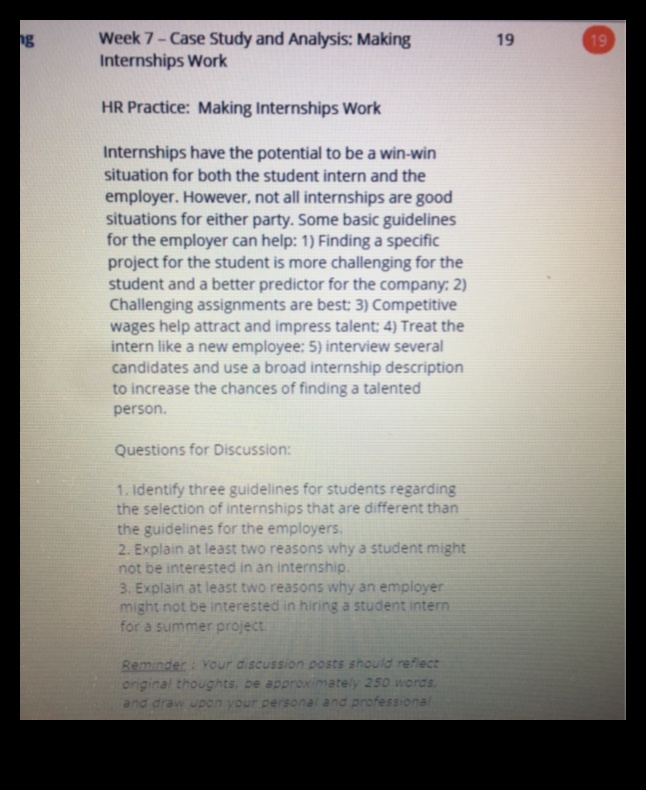
Do You Get Paid for an Internship?
Internships are a great way for students to gain experience in their field of study and to network with potential employers. However, many people wonder whether or not interns are typically paid. The answer to this question depends on a number of factors, including the industry, the company, and the student’s level of experience.
In general, internships in the tech industry are more likely to be paid than internships in other industries. This is because tech companies are often looking for talented interns who can help them with their projects. Additionally, tech companies are often able to afford to pay interns because they have a lot of money.
Internships at small companies are also more likely to be paid than internships at large companies. This is because small companies often have a smaller budget than large companies. Additionally, small companies may be more willing to pay interns because they are looking for talented people who can help them grow their business.
Finally, interns with more experience are more likely to be paid than interns with less experience. This is because interns with more experience are more valuable to employers. Additionally, interns with more experience are more likely to be able to negotiate a higher salary.
If you are considering an internship, it is important to do your research and find out whether or not the internship is paid. You can find this information on the company’s website or by contacting the company directly. If the internship is not paid, you should carefully consider whether or not it is worth your time and effort.
| Feature | Internship | Paid Internship |
|---|---|---|
| What is it? | A temporary position for students or recent graduates to gain work experience in a particular field. | A temporary position for students or recent graduates to gain work experience in a particular field, where the intern is paid a salary or stipend. |
| Benefits | Gain valuable work experience, network with professionals in your field, and explore potential career paths. | Gain valuable work experience, network with professionals in your field, explore potential career paths, and earn a salary or stipend. |
| How to find | Search online job boards, company websites, and career fairs. | Search online job boards, company websites, career fairs, and reach out to your network of contacts. |
| How to apply | Write a resume and cover letter, and tailor your application to each position. | Write a resume and cover letter, tailor your application to each position, and be prepared to interview. |

II. What is a paid internship?
A paid internship is a temporary job that provides students or recent graduates with the opportunity to gain real-world experience in their field of interest. In exchange for their work, interns typically receive a salary or stipend.
Paid internships can be a great way for students to learn new skills, network with professionals, and get their foot in the door of their desired industry. They can also be a valuable source of financial support.
However, it is important to note that not all internships are paid. Some internships are unpaid, which means that interns do not receive a salary or stipend. Unpaid internships can still be valuable learning experiences, but they can also be more difficult to find and may not provide the same level of financial support as paid internships.
If you are considering an internship, it is important to do your research and make sure that you understand the terms of the internship before you commit. Find out if the internship is paid or unpaid, what the hours are, and what kind of work you will be doing. It is also important to make sure that the internship is a good fit for your skills and interests.
III. Benefits of paid internships
Paid internships offer a number of benefits for students and recent graduates, including:
- Financial compensation
- Work experience
- Networking opportunities
- Professional development
- Mentorship
- Career advancement
Financial compensation can help students and recent graduates pay for school, living expenses, and other costs. Work experience can help students gain valuable skills and experience in their field of interest. Networking opportunities can help students connect with potential employers and learn about job openings. Professional development can help students improve their skills and knowledge. Mentorship can provide students with guidance and support as they navigate their careers. Career advancement can help students achieve their career goals.
Paid internships can be a valuable experience for students and recent graduates. They offer a number of benefits that can help students reach their career goals.

IV. How to find paid internships
There are a few different ways to find paid internships. Here are some of the most popular methods:
- Search online job boards and internship listings.
- Network with your friends, family, and professors.
- Contact companies directly to inquire about internship opportunities.
- Attend career fairs and job fairs.
- Join professional organizations and attend their events.
When searching for paid internships, it is important to be specific about your skills and interests. You should also be prepared to tailor your resume and cover letter to each individual internship you apply for. It is also important to be persistent and continue applying for internships even if you do not hear back immediately.

V. How to apply for paid internships
Once you have found a few paid internships that you are interested in, it is time to start applying. The application process for paid internships can vary depending on the company, but there are some general steps that you can follow to increase your chances of success.
First, take some time to research the company and the internship position. What are the company’s goals? What are the responsibilities of the internship position? The more you know about the company and the internship, the better you will be able to tailor your application.
Next, create a strong resume and cover letter. Your resume should be tailored to the specific internship position that you are applying for. Highlight your skills and experience that are relevant to the internship. Your cover letter should be brief and to the point. Introduce yourself, explain why you are interested in the internship, and highlight your qualifications.
Once you have created your resume and cover letter, it is time to start applying. Most companies have online application forms that you can fill out. Be sure to proofread your application carefully before submitting it.
If you are applying for a competitive internship, you may also want to consider networking. Reach out to people who work at the company or who know someone who does. Ask them if they would be willing to refer you for the internship.
The application process for paid internships can be challenging, but it is important to remember that you are not alone. Many other students are competing for the same positions. If you stay persistent and put your best foot forward, you will increase your chances of landing a paid internship.
Do you get paid for an internship?
The answer to this question depends on the internship. Some internships are unpaid, while others offer a stipend or salary. The type of internship you pursue will largely depend on your field of interest and your desired career path.
Unpaid internships are typically offered by small businesses or nonprofits that cannot afford to pay their interns. However, unpaid internships can still be valuable experiences, as they can provide you with the opportunity to gain hands-on experience in your field of interest, network with professionals, and build your resume.
Paid internships are typically offered by larger companies that have the budget to compensate their interns. Paid internships can be a great way to earn money while gaining valuable experience in your field. However, it is important to note that paid internships are not always guaranteed, and you may have to compete with other applicants for a limited number of positions.
Ultimately, the decision of whether or not to pursue an unpaid or paid internship is a personal one. You should weigh the pros and cons of each option before making a decision that is right for you.
Here are some factors to consider when making your decision:
- Your financial situation
- Your career goals
- The type of internship you are interested in
- The company that is offering the internship
If you are still undecided about whether or not to pursue an internship, it is a good idea to talk to your academic advisor or career counselor. They can help you weigh the pros and cons of each option and make a decision that is right for you.
Negotiating a paid internship
When you are offered a paid internship, it is important to negotiate your salary or stipend. This is your chance to get the most out of your internship experience and make sure that you are fairly compensated for your work.
There are a few things to keep in mind when negotiating your salary or stipend. First, do your research and find out what the average salary or stipend is for similar internships in your field. This will give you a starting point for your negotiations.
Second, consider your own skills and experience. If you have a lot of experience or skills that are valuable to the company, you may be able to ask for a higher salary or stipend.
Finally, be prepared to negotiate. The company may not be willing to give you everything you ask for, but you may be able to get a higher salary or stipend if you are willing to negotiate.
Here are some tips for negotiating your salary or stipend:
- Be confident and assertive.
- Be prepared to walk away if you don’t get what you want.
- Be polite and respectful.
- Thank the company for their offer and let them know that you are interested in the internship.
If you are successful in negotiating your salary or stipend, you will be able to get the most out of your internship experience and make sure that you are fairly compensated for your work.
Accepting a paid internship
Once you have been offered a paid internship, it is important to carefully consider the offer before making a decision. There are a few factors to keep in mind when making your decision, including:
- The salary and benefits offered
- The location of the internship
- The length of the internship
- The responsibilities of the internship
- The opportunity for professional development
Once you have considered all of these factors, you can make an informed decision about whether or not to accept the internship. If you decide to accept the internship, be sure to follow up with the employer to confirm the start date and any other details.
IX. Making the most of your paid internship
Paid internships can be a great way to gain valuable experience, learn new skills, and network with professionals in your field. However, in order to get the most out of your internship, it’s important to make the most of your time. Here are a few tips:
-
Be proactive. Don’t just wait for tasks to be assigned to you. Take initiative and seek out opportunities to learn new things and contribute to your team.
-
Ask questions. Don’t be afraid to ask questions, both of your supervisors and of your colleagues. This is a great way to learn new things and get the inside scoop on your industry.
-
Network. Use your internship as an opportunity to meet new people and build relationships with professionals in your field. These connections can be invaluable for your future career.
-
Stay positive. Even if your internship isn’t perfect, try to stay positive and make the most of the experience. A positive attitude will make you more enjoyable to work with and will help you learn and grow.
By following these tips, you can make the most of your paid internship and gain valuable experience that will help you in your future career.
X. FAQ
Q: What is the difference between a paid internship and an unpaid internship?
A: A paid internship is an internship that provides the intern with a salary or stipend in exchange for their work. An unpaid internship is an internship that does not provide the intern with any compensation.
Q: Are paid internships worth it?
A: Whether or not a paid internship is worth it depends on your individual circumstances. Some factors to consider include the salary or stipend offered, the length of the internship, the benefits offered, and the opportunities for professional development.
Q: How can I find paid internships?
There are a number of ways to find paid internships. Some of the most popular methods include:
- Searching online job boards
- Networking with friends, family, and mentors
- Contacting companies directly
- Attending career fairs
- Applying for internships through your university or college